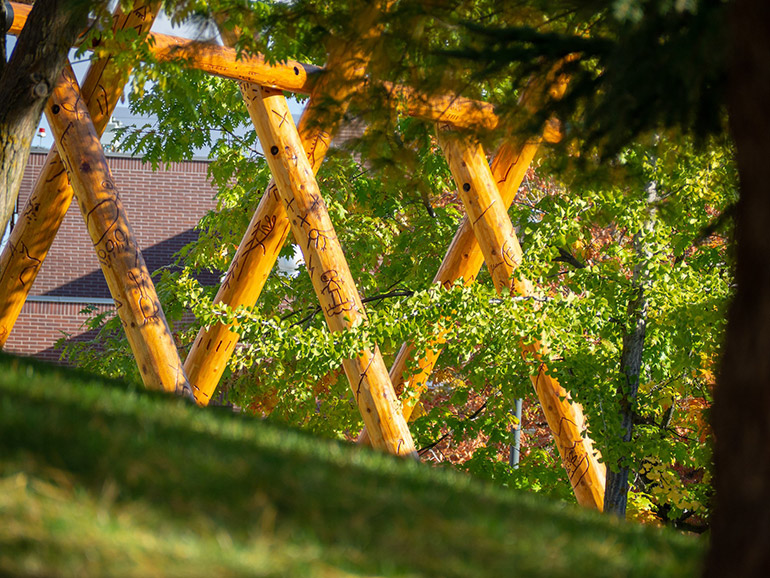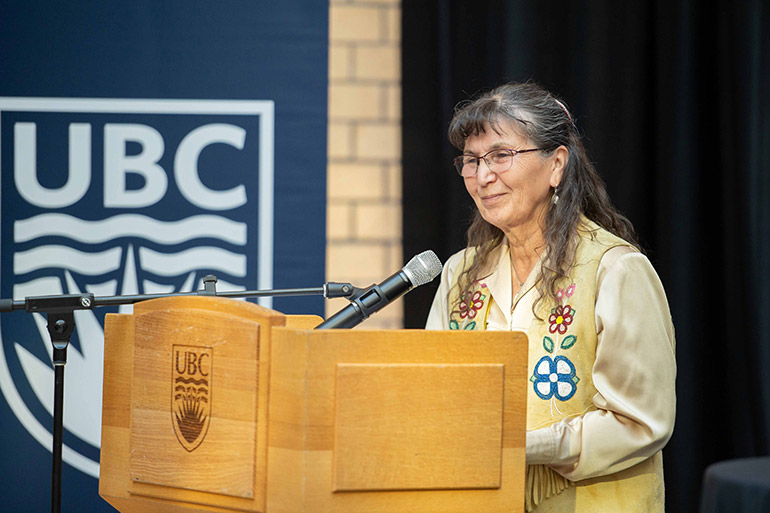
Undergraduate degree taught in Nsyilxcn the first of many to come, degree organizers say
UBC’s Okanagan campus, located in the territory of the Syilx Okanagan Nation, is set to become the first university in Canada to offer a bachelor’s degree in Indigenous language fluency.
The Bachelor of Nsyilxcn Language Fluency (BNLF) program, created in collaboration with the Nicola Valley Institute of Technology (NVIT) and the En’owkin Centre, is designed to work closely with the community to provide a comprehensive and high-quality education in Nsyilxcn—the language spoken by members of the Syilx Okanagan Nation—and to promote new, fluent speakers with a deep understanding of the language, culture, and customs.
“The idea that there’s only knowledge in English or French is absolutely not true,” says Dr. Jeannette Armstrong, associate professor of Indigenous Studies at UBC Okanagan and academic lead on the BNLF. “Language is identity. Indigenous knowledge systems and an Indigenous paradigm—how we view the world and how we interact—is deeply rooted in language.”
She adds that the transfer of Indigenous ideas and consciousness can only happen through the knowledge systems that are resident in the language.
“We hope to help foster a revitalization of the Nsyilxcn language in our communities and to see it spread across all domains of community life,” says Dr. Armstrong. “This is an important step in acting on Indigenous peoples’ rights to develop and transmit their languages, knowledge, and oral traditions.”

Dr. Jeannette Armstrong, associate professor of Indigenous Studies at UBC Okanagan.
According to Dr. Armstrong, UBC Okanagan is the first in Canada and one of the first in the world to offer a degree program in an Indigenous language, something she says is a testament to UBC’s commitments to the Truth and Reconciliation Commission of Canada (TRC) Calls to Action.
As part of the University of British Columbia’s own response to the TRC’s Calls to Action, UBC Okanagan signed a declaration in 2019 that specifies action on five recommendations developed by its Aboriginal Advisory Committee. One of those five commitments was to develop activities that support the revitalization of Indigenous language fluency.
“To study in your language and your knowledge systems, which many English speakers take for granted, is not there for Indigenous peoples,” she says. “UBC Okanagan is at the cutting edge in making that breakthrough—it’s a powerful statement of reconciliation.”
The four-year Bachelor of Nsyilxcn Language Fluency (BNLF) will see students complete the first two in a certificate and diploma program in Nsyilxcn Language Fluency from NVIT and finish the last two at UBC Okanagan in the Irving K. Barber Faculty of Arts and Social Sciences. It will feature a mix of on campus, classroom learning and work directly with the community.
The BNLF is the product of the Indigenous Language Proficiency and Fluency Degree Framework Partnership—a collaboration between the First Nations Education Steering Committee (FNESC), the Indigenous Adult and Higher Learning Association (IAHLA) and the Language Fluency Degree Consortium (LFDC). The framework is designed to create a province-wide, Indigenous language fluency degree programs that reflect and embed the culturally distinct requirements of the Indigenous community and Indigenous post-secondary institute partners.
“We congratulate En’owkin Centre and the University of British Columbia for their ground-breaking work in bringing the vision of a First Nation fluency degree to fruition,” says Dr. Verna Billy Minnabarriet, vice-president of strategic partnerships at NVIT and chair of IAHLA. “With this new degree we are creating a supportive and responsive mechanism that First Nations can use and adapt to meet their needs to produce fluent speakers of their languages.”
Tyrone McNeil, president of FNESC, agrees.
“The Nsyilxcn Language Fluency Degree aligns with the framework that we have been collectively developing over many years and we are confident that its implementation across the province will advance the Aboriginal Post-Secondary Education and Training Policy Framework, the Calls to Action of the Truth and Reconciliation Commission, and the United Nations Declaration on the Rights of Indigenous Peoples,” he says. “It exemplifies how a respectful and impactful partnership between First Nations, Indigenous institutes, and post-secondary institutions, can advance language revitalization and help develop the next generation of fluent language teachers.
The BC Ministry of Advanced Education and Skills Training provided $2 million towards the Indigenous Language Proficiency and Fluency Degree Framework for six communities and First Nations-mandated institutes to partner with post-secondary institutions to develop and deliver language degrees.
“This degree is an important achievement at a critical time,” said Anne Kang, minister of advanced education and skills training. “It’s an act of reconciliation and I congratulate the Syilx Nation, the En’owkin Centre, Nicola Valley Institute of Technology, UBC Okanagan, and all the Elders, Knowledge Keepers, speakers and students who have made this possible. Thank you for your work to protect and restore the linguistic heritage of the Syilx/Okanagan People and be the first to work within this new framework designed to support and revive first languages.”
With the BNLF degree representing years of effort by a large number of partners, Dr. Armstrong is quick to point out the support they receive from individual Nsyilxcn speakers in the community.
“We’re grateful for the support from each of the seven communities we’re working with,” she says. “The program relies on the fluent speakers and knowledge keepers, as well as the cultural context of those communities.”
Dr. Armstrong explains that the program piloted last year in three communities and that there are already 15 students set to graduate from the NVIT certificate. Many of them have expressed an interest in continuing their studies with UBC Okanagan when it accepts its first incoming class in September 2021.
“This is an exciting time in the history of our campus and for the relationship we’ve developed with Nsyilxcn speakers throughout the Okanagan,” she says.
“My hope is that this is the first of many more B.C. Indigenous language programs – to come, and that we will be able to expand our collaborations to include other Interior Salishan Languages here at UBC Okanagan.”
About UBC’s Okanagan campus
UBC’s Okanagan campus is an innovative hub for research and learning founded in 2005 in partnership with local Indigenous peoples, the Syilx Okanagan Nation, in whose territory the campus resides. As part of UBC—ranked among the world’s top 20 public universities—the Okanagan campus combines a globally recognized UBC education with a tight-knit and entrepreneurial community that welcomes students and faculty from around the world in British Columbia’s stunning Okanagan Valley.
To find out more, visit: ok.ubc.ca